Unit 1 Relationships Lesson 2 How Do We Like Teachers' Feed back课件(共32张PPT)北师大版(2019)选择性必修第一册
文档属性
| 名称 | Unit 1 Relationships Lesson 2 How Do We Like Teachers' Feed back课件(共32张PPT)北师大版(2019)选择性必修第一册 | 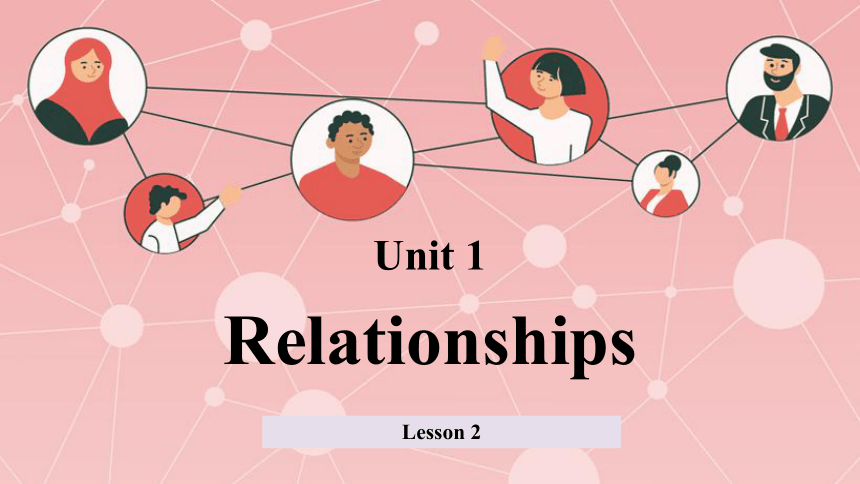 | |
| 格式 | pptx | ||
| 文件大小 | 37.8MB | ||
| 资源类型 | 教案 | ||
| 版本资源 | 北师大版(2019) | ||
| 科目 | 英语 | ||
| 更新时间 | 2025-07-28 17:22:47 | ||
图片预览

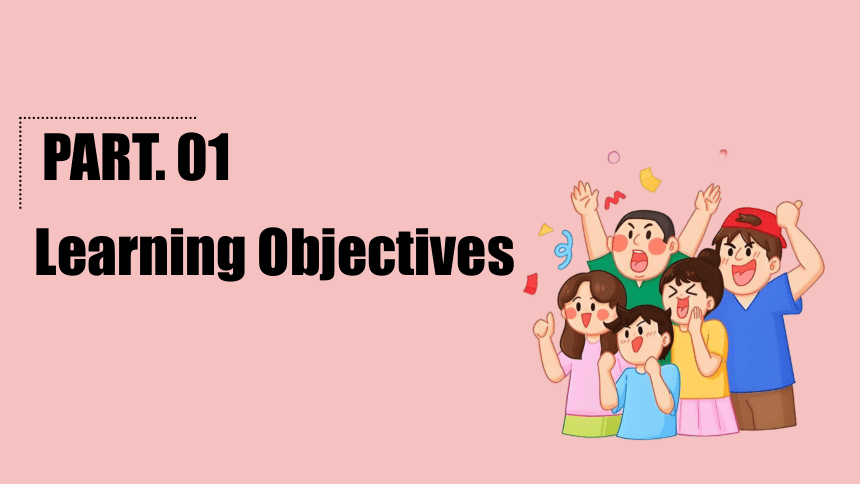
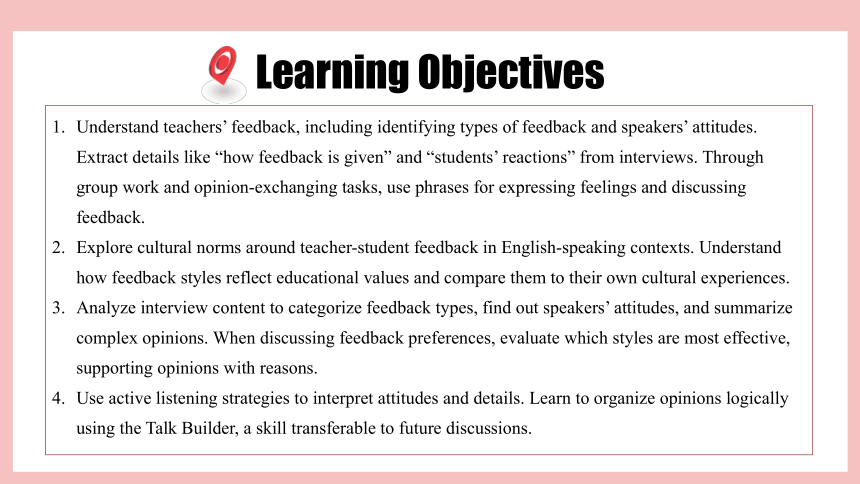
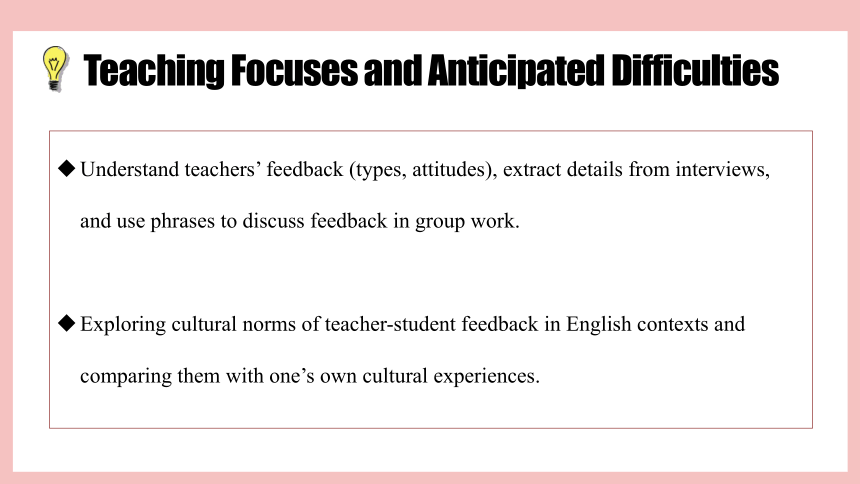

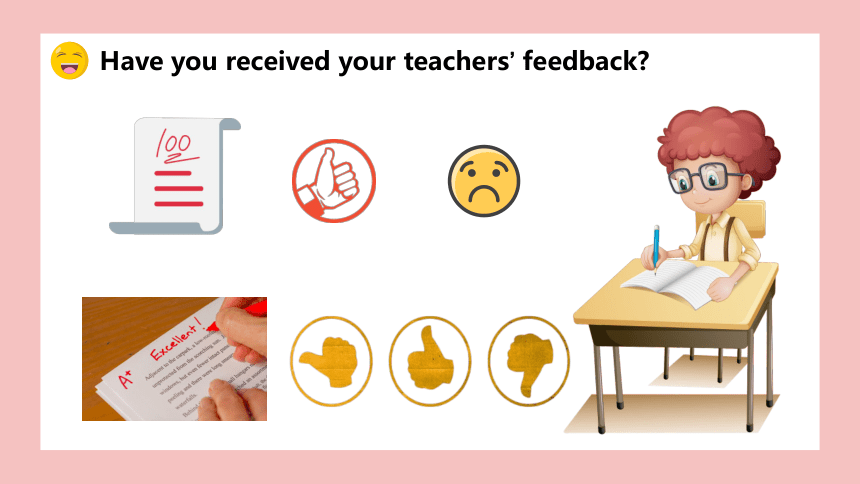
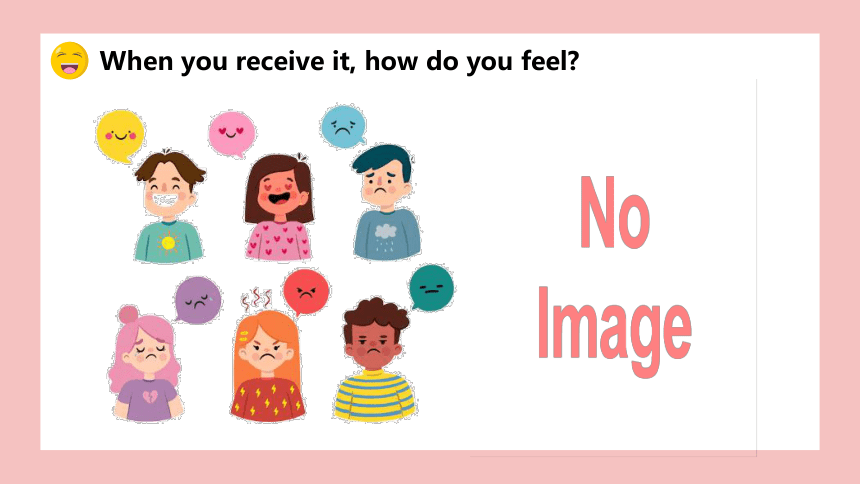
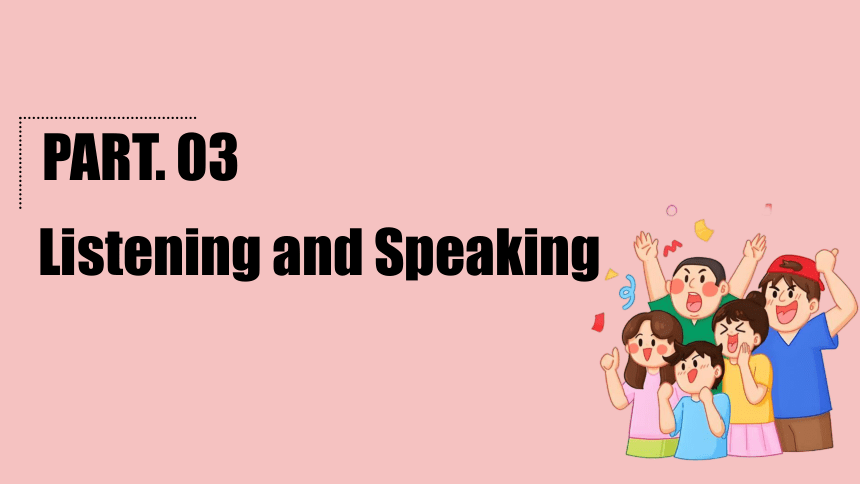
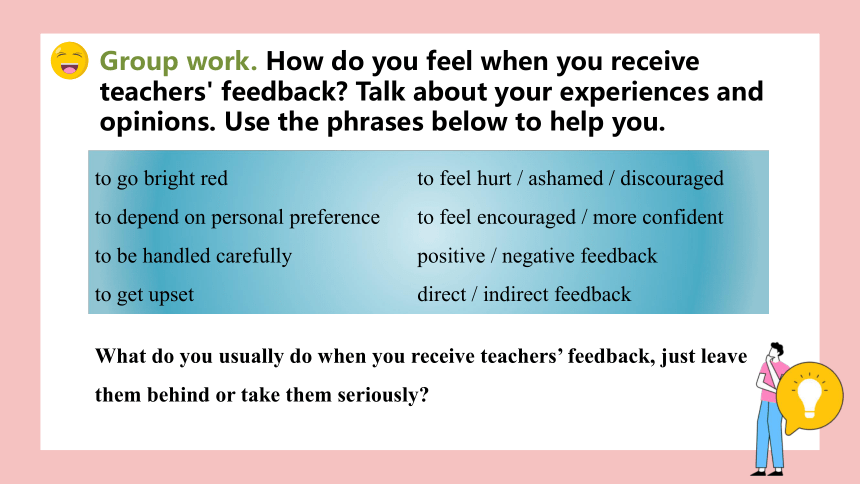
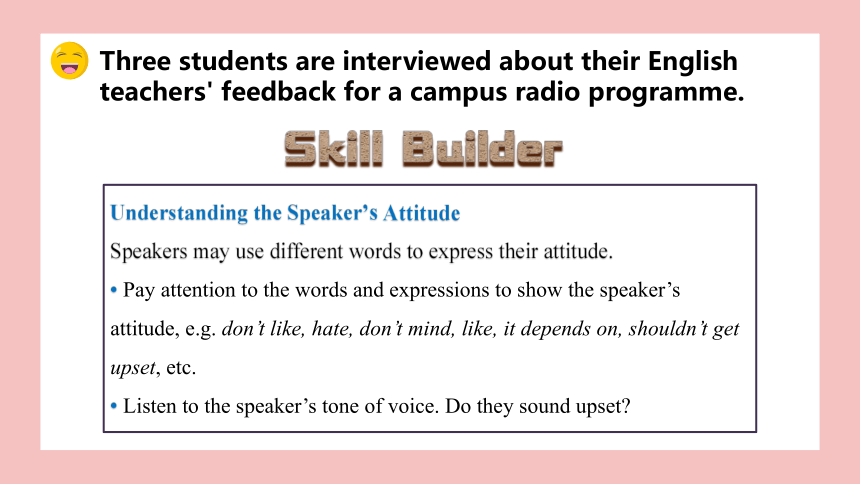
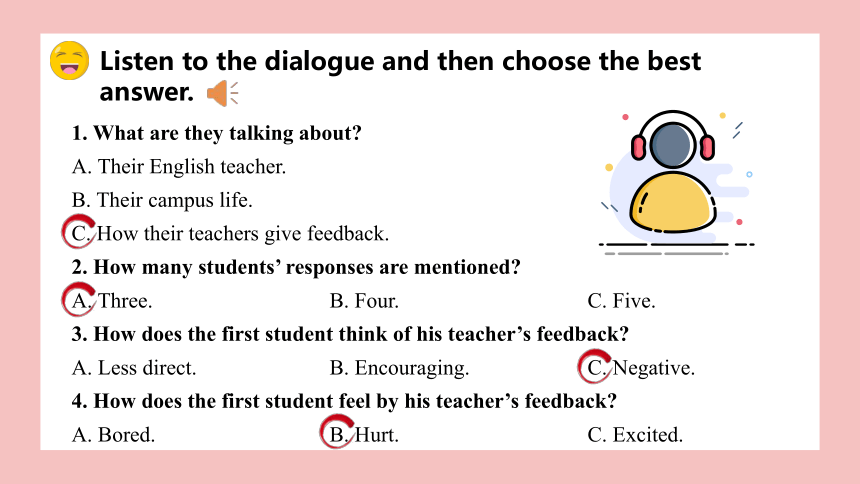
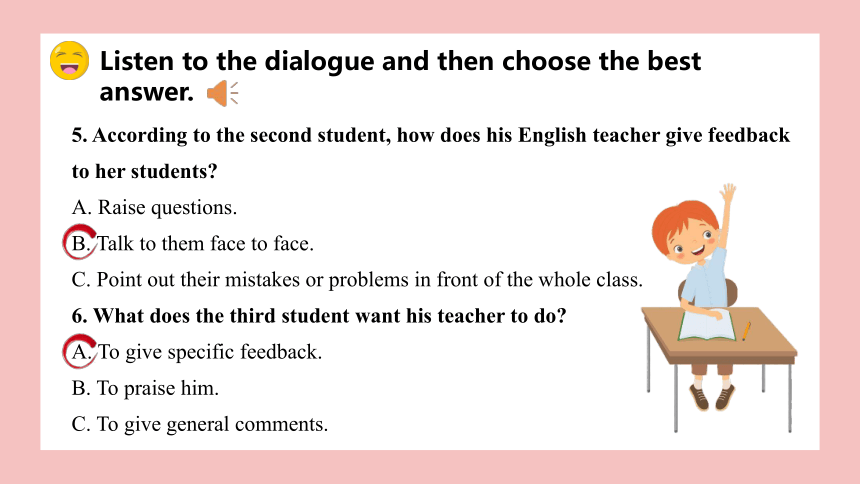
文档简介
(共32张PPT)
Unit 1
Relationships
Lesson 2
Learning Objectives
PART. 01
Understand the daily study and life of British middle school students by watching videos. Based on your own daily study and life, compare the study and life in Chinese and British schools, and find out the similarities and differences between the two. Talk about your first impression of high school life, and have a preliminary perception of the study and life in the senior high school stage.
Learning Objectives
Understand teachers’ feedback, including identifying types of feedback and speakers’ attitudes. Extract details like “how feedback is given” and “students’ reactions” from interviews. Through group work and opinion-exchanging tasks, use phrases for expressing feelings and discussing feedback.
Explore cultural norms around teacher-student feedback in English-speaking contexts. Understand how feedback styles reflect educational values and compare them to their own cultural experiences.
Analyze interview content to categorize feedback types, find out speakers’ attitudes, and summarize complex opinions. When discussing feedback preferences, evaluate which styles are most effective, supporting opinions with reasons.
Use active listening strategies to interpret attitudes and details. Learn to organize opinions logically using the Talk Builder, a skill transferable to future discussions.
Understand the daily study and life of British middle school students by watching videos. Based on your own daily study and life, compare the study and life in Chinese and British schools, and find out the similarities and differences between the two. Talk about your first impression of high school life, and have a preliminary perception of the study and life in the senior high school stage.
Teaching Focuses and Anticipated Difficulties
Understand teachers’ feedback (types, attitudes), extract details from interviews, and use phrases to discuss feedback in group work.
Exploring cultural norms of teacher-student feedback in English contexts and comparing them with one’s own cultural experiences.
Lead-in
PART. 02
Have you received your teachers’ feedback
When you receive it, how do you feel
Listening and Speaking
PART. 03
Group work. How do you feel when you receive teachers' feedback Talk about your experiences and opinions. Use the phrases below to help you.
to go bright red to feel hurt / ashamed / discouraged
to depend on personal preference to feel encouraged / more confident
to be handled carefully positive / negative feedback
to get upset direct / indirect feedback
What do you usually do when you receive teachers’ feedback, just leave them behind or take them seriously
Three students are interviewed about their English teachers' feedback for a campus radio programme.
Understanding the Speaker’s Attitude
Speakers may use different words to express their attitude.
Pay attention to the words and expressions to show the speaker’s attitude, e.g. don’t like, hate, don’t mind, like, it depends on, shouldn’t get upset, etc.
Listen to the speaker’s tone of voice. Do they sound upset
Skill Builder
Listen to the dialogue and then choose the best answer.
1. What are they talking about
A. Their English teacher.
B. Their campus life.
C. How their teachers give feedback.
2. How many students’ responses are mentioned
A. Three. B. Four. C. Five.
3. How does the first student think of his teacher’s feedback
A. Less direct. B. Encouraging. C. Negative.
4. How does the first student feel by his teacher’s feedback
A. Bored. B. Hurt. С. Excited.
Listen to the dialogue and then choose the best answer.
5. According to the second student, how does his English teacher give feedback to her students
A. Raise questions.
B. Talk to them face to face.
C. Point out their mistakes or problems in front of the whole class.
6. What does the third student want his teacher to do
A. To give specific feedback.
B. To praise him.
C. To give general comments.
Listen and complete the information in the second column of the table. Then, listen again and complete the rest of the table.
How the interviewee’s teacher gives feedback Types of feedback Students’ reactions / feelings
Student 1 usually points out our ___________________ in front of the ____________
Student 2 Talks to us ___________ _____________ where our problems are and how we can improve gives us an opportunity to_________________ _________ about anything we don’t understand
Student 3 gives very ________________ such as “good, excellent, well done” doesn’t __________ my mistakes and give suggestions
mistakes or problems
whole class
negative
feel quite hurt and lose confidence
face to face
tells us exactly
raise further
questions
direct, positive
helpful
general comments
point out
indirect
not enough
Group Work.
1. Act out the interview in groups of four. Use the notes in Activity 2 to help you.
2. How many types of feedback have you noted down Sort them into different categories, e.g. positive and negative. Think of more types of feedback if you can.
Positive and negative feedback
General and specific feedback
Direct and indirect feedback
face-to-face or written
Complete the summary with the words from the listening.
Matt Dickson interviewed three students about their feelings of English teachers’
1_________. The first student thinks his teacher’s feedback is negative and makes him lose 2___________. But he understands her 3_________. The second student thinks the feedback from her teacher is more 4_________ even though it is more 5_________ for her teacher. She can raise 6________ questions about anything she doesn’t understand. The third student thinks his teacher often gives very general 7__________. But he wants to know where his 8_________ and weaknesses are. He thinks feedback should be 9_________. For example, the teacher can 10_________ his mistakes and say things like “You need to work on the past 11________.
feedback
confidence
intention
effective
demanding
further
comments
strengths
specific
highlight
tenses
Listen to the conversation and then choose the best answer.
1. What’s the possible relationship between the two speakers
A. Interviewer and interviewee. B. Husband and wife. C. Colleagues.
2. What are they talking about
A. Giving feedback to students.
B. An interesting radio programme.
C. Students’ preference in study.
3. Who like to give feedback directly
A. The female. B. The male. C. Neither of them.
Listen to the conversation between two professors about giving teachers' feedback to students. Find out their opinions and reasons.
Opinions Reasons
Professor Smith
Professor Jones
Try to give feedback in a less direct manner.
It is best to point out students’ problem directly.
Understand some students’ feelings about negative feedback. Negative feedback might hurt students’ confidence and interest in learning.
Students need to get used to tough comments when they don’t do good work.
Listen and plete the Talk Builder.
Exchanging Opinions
1. _____________ it is best to point out students' problems directly.
2. Also, _____________ they should realise that any feedback isn’t personal.
3. _______________ you about that, but to be more helpful…
4. _______________. Perhaps I should try that.
Talk Builder
I believe
I think
I can agree with
I see your point
I see your point I believe
I can agree with I think
The following phrases from listening materials can
be used when you exchange opinions with others.
I have to say that...
To be honest, ...
But I do understand...
I really wish that...
in other words
for example
in this way
What do you think about...
I found it...
I believe / think...
This is more... because...
My opinion is that...
I can agree with you about...
I see your point, but...
Group work. Choose three teachers who teach different subjects. Tell them what you liked about the feedback you have received from them in the past, and how you would like to receive their feedback in the future.
Vocabulary
1. preference
have a preference for 偏爱,喜爱
give preference to 优先考虑
prefer v. 更喜欢,偏好
prefer…to… 相比……更喜欢……
prefer doing/to do sth 宁愿做某事
prefer sb. to do sth. 宁愿某人做某事
prefer doing…to doing… 更喜欢做……而不喜欢做……
prefer to do…rather than do… 宁愿做……而不愿做……
例题:
Companies give preference ______ skilled workers.
to
Vocabulary
2. upset
be upset about/over/at sth. 为某事烦心
be upset to do sth. 对做某事感到不安
(sth.) upset sb. (某事)使某人心烦意乱
(sb.) upset sth. (某人)打翻某物
upset oneself about sth. 为某事烦恼
例题:
Teenagers often upset themselves _______ their future careers, but it’s better to take things step by step.
about
Vocabulary
3. ashamed
shame n. 羞耻,羞愧;让人遗憾的事
be ashamed of… 对……感到惭愧
be ashamed to do sth. 羞于做某事;因惭愧而不愿做某事
What a shame…/ It is a shame that… 真可惜……
例题:
He was ashamed _______ his rude remarks to the teacher and apologized sincerely the next day.
of
Vocabulary
4. manner
in the manner of… 以……方式
good/bad manner 有/ 没有礼貌
table manners 餐桌礼仪
ill-mannered 无礼的;举止不当的
well-mannered 有礼貌的;举止得当的
例题:
Parents often teach children table _________(manner), such as not talking with a full mouth, from an early age.
manners
Exercise
PART. 04
1. In your essay, you should h_________(突出显示) the relationship between environmental pollution and public health.
2. The manager trusted her to h_______(处理) the urgent project because of her strong organizational skills.
3. She is s_________(敏感的) to others’ feelings, so she always chooses her words carefully in conversations.
4. She decided to r______(提起) the issue of flexible working hours with her manager in the next meeting.
ighlight
Exercise: 单词拼写
andle
ensitive
aise
1. Regular review is an _________(effect) way to retain knowledge and improve exam performance.
2. The company declared its _________(intend) to expand into Asian markets, starting with Japan and South Korea.
3. Ballet is a ____________(demand) art form, requiring years of training to master technique and express emotion through movement.
4. A truly brave person will feel ________(shame) of his mistakes and try to correct them.
effective
Exercise: 用所给词的适当形式填空
intention
demanding
ashamed
Summary
PART. 05
添加标题
ADD THE TITLE HERE
Lesson 2
Vocabulary
How teachers give feedback.
Giving feedback to students.
Listening
preference, upset, ashamed, manner
Homework
PART. 06
Write down the feedback you have received from teachers and discuss them with your partners.
Homework
See you next class!
Unit 1
Relationships
Lesson 2
Learning Objectives
PART. 01
Understand the daily study and life of British middle school students by watching videos. Based on your own daily study and life, compare the study and life in Chinese and British schools, and find out the similarities and differences between the two. Talk about your first impression of high school life, and have a preliminary perception of the study and life in the senior high school stage.
Learning Objectives
Understand teachers’ feedback, including identifying types of feedback and speakers’ attitudes. Extract details like “how feedback is given” and “students’ reactions” from interviews. Through group work and opinion-exchanging tasks, use phrases for expressing feelings and discussing feedback.
Explore cultural norms around teacher-student feedback in English-speaking contexts. Understand how feedback styles reflect educational values and compare them to their own cultural experiences.
Analyze interview content to categorize feedback types, find out speakers’ attitudes, and summarize complex opinions. When discussing feedback preferences, evaluate which styles are most effective, supporting opinions with reasons.
Use active listening strategies to interpret attitudes and details. Learn to organize opinions logically using the Talk Builder, a skill transferable to future discussions.
Understand the daily study and life of British middle school students by watching videos. Based on your own daily study and life, compare the study and life in Chinese and British schools, and find out the similarities and differences between the two. Talk about your first impression of high school life, and have a preliminary perception of the study and life in the senior high school stage.
Teaching Focuses and Anticipated Difficulties
Understand teachers’ feedback (types, attitudes), extract details from interviews, and use phrases to discuss feedback in group work.
Exploring cultural norms of teacher-student feedback in English contexts and comparing them with one’s own cultural experiences.
Lead-in
PART. 02
Have you received your teachers’ feedback
When you receive it, how do you feel
Listening and Speaking
PART. 03
Group work. How do you feel when you receive teachers' feedback Talk about your experiences and opinions. Use the phrases below to help you.
to go bright red to feel hurt / ashamed / discouraged
to depend on personal preference to feel encouraged / more confident
to be handled carefully positive / negative feedback
to get upset direct / indirect feedback
What do you usually do when you receive teachers’ feedback, just leave them behind or take them seriously
Three students are interviewed about their English teachers' feedback for a campus radio programme.
Understanding the Speaker’s Attitude
Speakers may use different words to express their attitude.
Pay attention to the words and expressions to show the speaker’s attitude, e.g. don’t like, hate, don’t mind, like, it depends on, shouldn’t get upset, etc.
Listen to the speaker’s tone of voice. Do they sound upset
Skill Builder
Listen to the dialogue and then choose the best answer.
1. What are they talking about
A. Their English teacher.
B. Their campus life.
C. How their teachers give feedback.
2. How many students’ responses are mentioned
A. Three. B. Four. C. Five.
3. How does the first student think of his teacher’s feedback
A. Less direct. B. Encouraging. C. Negative.
4. How does the first student feel by his teacher’s feedback
A. Bored. B. Hurt. С. Excited.
Listen to the dialogue and then choose the best answer.
5. According to the second student, how does his English teacher give feedback to her students
A. Raise questions.
B. Talk to them face to face.
C. Point out their mistakes or problems in front of the whole class.
6. What does the third student want his teacher to do
A. To give specific feedback.
B. To praise him.
C. To give general comments.
Listen and complete the information in the second column of the table. Then, listen again and complete the rest of the table.
How the interviewee’s teacher gives feedback Types of feedback Students’ reactions / feelings
Student 1 usually points out our ___________________ in front of the ____________
Student 2 Talks to us ___________ _____________ where our problems are and how we can improve gives us an opportunity to_________________ _________ about anything we don’t understand
Student 3 gives very ________________ such as “good, excellent, well done” doesn’t __________ my mistakes and give suggestions
mistakes or problems
whole class
negative
feel quite hurt and lose confidence
face to face
tells us exactly
raise further
questions
direct, positive
helpful
general comments
point out
indirect
not enough
Group Work.
1. Act out the interview in groups of four. Use the notes in Activity 2 to help you.
2. How many types of feedback have you noted down Sort them into different categories, e.g. positive and negative. Think of more types of feedback if you can.
Positive and negative feedback
General and specific feedback
Direct and indirect feedback
face-to-face or written
Complete the summary with the words from the listening.
Matt Dickson interviewed three students about their feelings of English teachers’
1_________. The first student thinks his teacher’s feedback is negative and makes him lose 2___________. But he understands her 3_________. The second student thinks the feedback from her teacher is more 4_________ even though it is more 5_________ for her teacher. She can raise 6________ questions about anything she doesn’t understand. The third student thinks his teacher often gives very general 7__________. But he wants to know where his 8_________ and weaknesses are. He thinks feedback should be 9_________. For example, the teacher can 10_________ his mistakes and say things like “You need to work on the past 11________.
feedback
confidence
intention
effective
demanding
further
comments
strengths
specific
highlight
tenses
Listen to the conversation and then choose the best answer.
1. What’s the possible relationship between the two speakers
A. Interviewer and interviewee. B. Husband and wife. C. Colleagues.
2. What are they talking about
A. Giving feedback to students.
B. An interesting radio programme.
C. Students’ preference in study.
3. Who like to give feedback directly
A. The female. B. The male. C. Neither of them.
Listen to the conversation between two professors about giving teachers' feedback to students. Find out their opinions and reasons.
Opinions Reasons
Professor Smith
Professor Jones
Try to give feedback in a less direct manner.
It is best to point out students’ problem directly.
Understand some students’ feelings about negative feedback. Negative feedback might hurt students’ confidence and interest in learning.
Students need to get used to tough comments when they don’t do good work.
Listen and plete the Talk Builder.
Exchanging Opinions
1. _____________ it is best to point out students' problems directly.
2. Also, _____________ they should realise that any feedback isn’t personal.
3. _______________ you about that, but to be more helpful…
4. _______________. Perhaps I should try that.
Talk Builder
I believe
I think
I can agree with
I see your point
I see your point I believe
I can agree with I think
The following phrases from listening materials can
be used when you exchange opinions with others.
I have to say that...
To be honest, ...
But I do understand...
I really wish that...
in other words
for example
in this way
What do you think about...
I found it...
I believe / think...
This is more... because...
My opinion is that...
I can agree with you about...
I see your point, but...
Group work. Choose three teachers who teach different subjects. Tell them what you liked about the feedback you have received from them in the past, and how you would like to receive their feedback in the future.
Vocabulary
1. preference
have a preference for 偏爱,喜爱
give preference to 优先考虑
prefer v. 更喜欢,偏好
prefer…to… 相比……更喜欢……
prefer doing/to do sth 宁愿做某事
prefer sb. to do sth. 宁愿某人做某事
prefer doing…to doing… 更喜欢做……而不喜欢做……
prefer to do…rather than do… 宁愿做……而不愿做……
例题:
Companies give preference ______ skilled workers.
to
Vocabulary
2. upset
be upset about/over/at sth. 为某事烦心
be upset to do sth. 对做某事感到不安
(sth.) upset sb. (某事)使某人心烦意乱
(sb.) upset sth. (某人)打翻某物
upset oneself about sth. 为某事烦恼
例题:
Teenagers often upset themselves _______ their future careers, but it’s better to take things step by step.
about
Vocabulary
3. ashamed
shame n. 羞耻,羞愧;让人遗憾的事
be ashamed of… 对……感到惭愧
be ashamed to do sth. 羞于做某事;因惭愧而不愿做某事
What a shame…/ It is a shame that… 真可惜……
例题:
He was ashamed _______ his rude remarks to the teacher and apologized sincerely the next day.
of
Vocabulary
4. manner
in the manner of… 以……方式
good/bad manner 有/ 没有礼貌
table manners 餐桌礼仪
ill-mannered 无礼的;举止不当的
well-mannered 有礼貌的;举止得当的
例题:
Parents often teach children table _________(manner), such as not talking with a full mouth, from an early age.
manners
Exercise
PART. 04
1. In your essay, you should h_________(突出显示) the relationship between environmental pollution and public health.
2. The manager trusted her to h_______(处理) the urgent project because of her strong organizational skills.
3. She is s_________(敏感的) to others’ feelings, so she always chooses her words carefully in conversations.
4. She decided to r______(提起) the issue of flexible working hours with her manager in the next meeting.
ighlight
Exercise: 单词拼写
andle
ensitive
aise
1. Regular review is an _________(effect) way to retain knowledge and improve exam performance.
2. The company declared its _________(intend) to expand into Asian markets, starting with Japan and South Korea.
3. Ballet is a ____________(demand) art form, requiring years of training to master technique and express emotion through movement.
4. A truly brave person will feel ________(shame) of his mistakes and try to correct them.
effective
Exercise: 用所给词的适当形式填空
intention
demanding
ashamed
Summary
PART. 05
添加标题
ADD THE TITLE HERE
Lesson 2
Vocabulary
How teachers give feedback.
Giving feedback to students.
Listening
preference, upset, ashamed, manner
Homework
PART. 06
Write down the feedback you have received from teachers and discuss them with your partners.
Homework
See you next class!
同课章节目录
- Unit 1 Relationshis
- Lesson 1 Teachers
- Lesson 2 How Do We Like Teachers’ Feedback?
- Lesson 3 So Close,Yet So Fa
- Unit 2 Success
- Lesson 1 Money vs Success
- Lesson 2 Top Five Secrets of Success
- Lesson 3 Getting to the Top
- Unit 3 Conservation
- Lesson 1 The Sixth Extinction
- Lesson 2 War on Plastic Packets
- Lesson 3 The Road to Destruction
